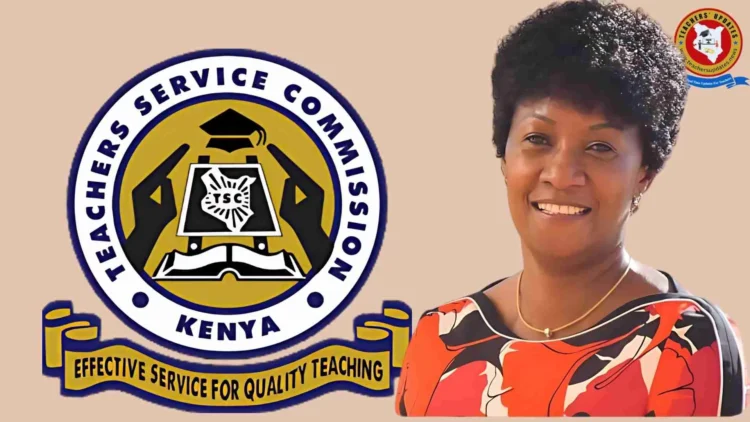Teachers Outcry as TSC Allocates Employment Letters to Politicians.
A storm has erupted following Murang’a Woman Representative Betty Njeri Maina’s disclosure that Members of Parliament (MPs) allied with the government recently received Teachers Service Commission (TSC) employment letters to distribute among their constituents. The revelation has sparked widespread condemnation over alleged irregular hiring practices.
Teachers’ unions have strongly opposed this method, arguing that it violates legal provisions and deprives qualified Kenyans of employment opportunities at a time when the nation is grappling with high unemployment rates among trained teachers.
Ms. Maina detailed that they were summoned to State House, where she openly admitted to receiving employment letters for teachers. She mentioned that she was accompanied by eleven MPs from Kiambu, each receiving twenty letters, totaling 220.
Additionally, she noted that from Murang’a, Mathioya MP Dr. Edwin Mugo was also present. She emphasized that many teachers in Maragua Constituency were still waiting for jobs and stated that she would persuade the local MP to re-align with the government to ensure development projects, including job placements, benefit the region.
She further asserted that MPs who failed to attend the State House meeting had let their constituents down, as they missed the opportunity to secure teaching positions.
Jobs for Loyalty: An Open Secret
Ms. Maina’s statements inadvertently shed light on a widely acknowledged but rarely admitted reality in political circles: employment in public institutions is being used as a tool to reward political allegiance.
In a previous instance, former Education Cabinet Secretary Ezekiel Machogu was filmed personally handing an employment letter to an unemployed teacher at a public gathering in Kisii County. This incident further fueled concerns over favoritism in government job allocations.
Similarly, last year, Kibwezi West MP Mwengi Mutuse—who gained national attention after initiating the impeachment motion against former Deputy President Rigathi Gachagua—boasted of his influence during a funeral in December.
He instructed attendees to identify a qualified teacher willing to work at Muatini Secondary School and provide the name before the end of the ceremony. He assured that the selected individual would be processed for employment by Monday and begin teaching immediately.
He rhetorically questioned whether anyone outside the government could facilitate such employment, reinforcing the notion that political alignment determines access to public sector jobs.
The unfolding controversy highlights deep concerns over transparency in public employment processes and the apparent politicization of job allocations within state institutions.
Political Influence Threatens Teacher Recruitment
The acting Secretary-General of the Kenya Union of Post-Primary Education Teachers (Kuppet), Moses Nthurima, and the deputy secretary-general of the Kenya National Union of Teachers (Knut), Hesbon Otieno, criticized the politicization of hiring practices, asserting that State House holds no authority to employ teachers.
Nthurima questioned the fairness of the process, arguing that Members of Parliament selecting acquaintances and relatives over qualified candidates undermines merit-based employment. He highlighted that graduates from 2016 still await placement, emphasizing that political connections should not determine recruitment.
According to Nthurima, prioritizing teachers based on political favoritism compromises fairness and disregards the policy of clearing the backlog of earlier graduates first.
Concerns were also raised regarding the independence of the Teachers Service Commission (TSC). Nthurima expressed alarm over the apparent issuance of employment forms to politicians, asserting that this practice weakens the Commission’s role and signals political interference in education. He insisted that such actions diminish the credibility of a sector that should be strictly professional.
Otieno echoed these sentiments, warning that political involvement would disrupt staffing norms and lead to an unequal distribution of teachers across the country. He stressed that TSC, as a professional entity, must maintain autonomy in recruiting and appointing staff.
Lack of Clarity in Employment Letters
Despite these concerns, the source of employment letters in politicians’ hands remains unclear. Attempts to seek clarification from TSC’s director for legal, labour, and industrial relations, Cavin Anyuor, were unsuccessful as he did not respond to calls or messages regarding the issue.
Trans Nzoia Governor George Natembeya also addressed the matter, asserting that access to employment letters is not universal among leaders but limited to those closely aligned with the government.
Read Also: KUPPET Demands Government Transparency on HELB and University Funding Model After Court Ruling
Natembeya pointed out that individuals with financial resources secure their positions, whereas those lacking financial means must depend on government assistance. He criticized this approach, stating that it disadvantages the most vulnerable and deserving teachers.
The Kenya Kwanza government had pledged in its manifesto to employ 116,000 teachers within two years of taking office. Thus far, 56,000 permanent teachers and 20,000 interns have been recruited. However, concerns persist over whether political favoritism is influencing the hiring process, potentially compromising the integrity of teacher recruitment in the country.
Teachers Outcry as TSC Allocates Employment Letters to Politicians.



Discussion about this post